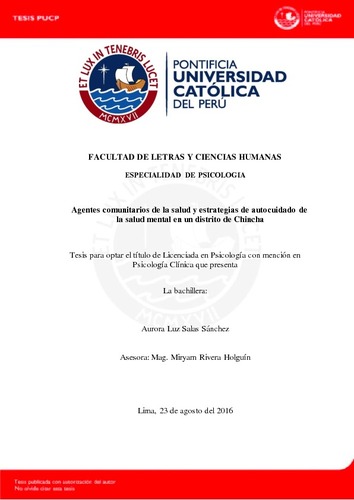| dc.contributor.advisor | Rivera Holguín, Miryam | es_ES |
| dc.contributor.author | Salas Sánchez, Aurora Luz | es_ES |
| dc.date.accessioned | 2016-11-14T13:20:18Z | es_ES |
| dc.date.available | 2016-11-14T13:20:18Z | es_ES |
| dc.date.created | 2016 | es_ES |
| dc.date.issued | 2016-11-14 | es_ES |
| dc.identifier.uri | http://hdl.handle.net/20.500.12404/7475 | |
| dc.description.abstract | La investigación sobre el agente comunitario de la salud y sus formas de procurar el autocuidado, es un vacío en la literatura científica tanto en el Perú y otros países de Latino América. El presente trabajo tiene por objetivo explorar las estrategias de autocuidado de la salud mental de un grupo de pobladores que se dedican a esta labor tomando en cuenta el concepto integral de salud. El diseño metodológico de este estudio se desarrolló de acuerdo a la perspectiva cualitativa, para ello se abordó a cada uno de los participantes en base a una guía semiestructurada de entrevista. Los resultados de la investigación evidencian que las estrategias de estos colaboradores de la salud radican en recurrir a las redes de soporte, las cuales se extienden al soporte utilitario brindado por instituciones públicas y privadas con el fin de mejorar la calidad de vida de la comunidad, para ello despliegan virtudes y fortalezas desarrolladas a lo largo de la vida. Asimismo, recurren a estrategias basadas en creencias y tradiciones culturales propias de su distrito, prevaleciendo las creencias religiosas basadas en la fe Católica y los rituales relacionados. Por otro lado, sus conductas están orientadas a prevenir riesgos ; en primer término, siguiendo las recomendaciones del MINSA. No obstante, se evidencia que los participantes realizan conductas que afectan su salud y que a largo plazo resultarían en la adquisición de un a enfermedad crónica. As imismo, los hallazgos reflejan que los participantes priorizan el trabajo y las labores cotidianas, postergando el atender dolencias existentes, las cuales son atendidas cuando su vida está en peligro . | es_ES |
| dc.description.abstract | Research about community health workers and ways of seeking self-care almost don't exist in the scientific literature, both in Peru and other Latin American countries. This investigation aims to explore strategies for self-care of a group of people engaged in this work taking into account the holistic concept of health. The methodological design of this study was carried out according to the qualitative perspective, for this reason was necessary to do interviews, these were conducted based on a semi-structured interview guide with each of the participants. The research results show that the strategies of these health collaborators are based in resorting to the social support, which extend to the support provided by public and private institutions in order to improve the quality of life of the community, for that reason they use their abilities, virtues and strengths developed during their life. Also they resort to strategies based on religious beliefs and cultural traditions, mainly their belief in the Catholic faith and rituals related. Also, their behaviors are aimed at preventing risks primarily as recommended by the Ministry of Health. However, it’s evident that participants perform behaviors that affect their health which after result in the acquisition of a chronic disease. Finally participants prioritize work and daily chores; they sometimes postpone curing existing ailments, which they’ll cure when their life is at risk. | es_ES |
| dc.language.iso | spa | es_ES |
| dc.publisher | Pontificia Universidad Católica del Perú | es_ES |
| dc.rights | Atribución-NoComercial-SinDerivadas 2.5 Perú | * |
| dc.rights | info:eu-repo/semantics/openAccess | es_ES |
| dc.rights.uri | http://creativecommons.org/licenses/by-nc-nd/2.5/pe/ | * |
| dc.subject | Salud mental. | es_ES |
| dc.subject | Actitudes sanitarias. | es_ES |
| dc.subject | Salud pública--Perú--Ica--Chincha. | es_ES |
| dc.title | Agentes comunitarios de la salud y estrategias de autocuidado de la salud mental en un distrito de Chincha | es_ES |
| dc.type | info:eu-repo/semantics/bachelorThesis | es_ES |
| thesis.degree.name | Licenciado en Psicología Clínica | es_ES |
| thesis.degree.level | Título Profesional | es_ES |
| thesis.degree.grantor | Pontificia Universidad Católica del Perú. Facultad de Letras y Ciencias Humanas. | es_ES |
| thesis.degree.discipline | Psicología Clínica | es_ES |
| renati.discipline | 313026 | es_ES |
| renati.level | https://purl.org/pe-repo/renati/level#tituloProfesional | es_ES |
| renati.type | http://purl.org/pe-repo/renati/type#tesis | es_ES |
| dc.publisher.country | PE | es_ES |
| dc.subject.ocde | https://purl.org/pe-repo/ocde/ford#5.01.00 | es_ES |






